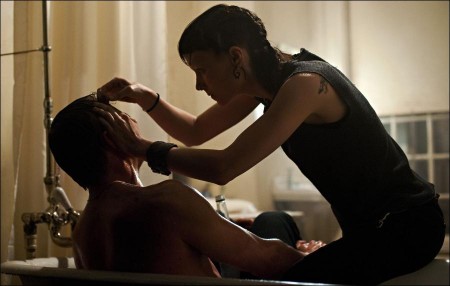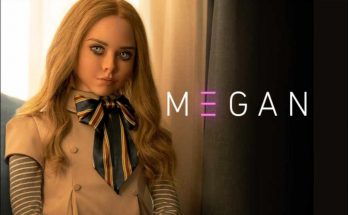As most of you know, Dragon Tattoo is the first in Stieg Larson’s Millennium trilogy and it centers on a disgraced journalist who’s hired to investigate the mysterious 40-year-old disappearance of a young woman. Rooney Mara plays Lisbeth Salander, a brilliant young hacker who teams up.
I heard that your original cut on this was over three hours.
David Fincher: It was three hours and seven minutes.
Exactly, and you’re releasing a…
Fincher: Two hour and forty… well, again, I have to count titles contractually. But if you’re talking about the movie, the movie’s two hours and thirty-three minutes.
Either way, there was a lot of talk about you debating how to cut twenty minutes out of the movie.
Fincher: Somebody asked me, “At what point did you decide the movie should be two hours and thirty three minutes?” And I said, “At the point in time where it was three hours.” It was pretty obvious when you looked at it that we could sustain a lot of interest, but I didn’t think we could sustain three hours worth of interest.
Are you going to release the additional footage?
Fincher: Nope.
So that footage is never going to see the light of day?
Fincher: No, I don’t believe in that. I’m a final cut director. Oliver Stone’s a final cut director. Why would JFK, the one we saw, be different from the one that’s on the DVD? Tell your story, man.
100%, except that studios today release extended cuts and unrated editions.
Fincher: I don’t believe in that. I think that’s like jerk-off land. Put your best foot forward.
Okay, let me ask you this, Lord of the Rings, the theatrical versions are fantastic; the extended versions for the fans are amazing.
Fincher: I’ve never seen them, the extended versions.
I would argue that the extended version of Fellowship of the Ring is better than the theatrical version because you get more character stuff and it’s an amazing extended edition. I would imagine for fans of the book, and fans of yours, they would really love to see twenty more minutes of your material. I would argue that a lot of people would like to see the footage.
Fincher: And they may, but I took out stuff that I thought was weak. I took out stuff that I didn’t think was as good as the other stuff. There were moments that I would have wanted to have had, but it either killed the pace of the thing or it gave you an impression that the movie was starting again. I’m happy with this version of it. I won’t be re-opening this thirty years from now and re-digitizing it in 8k.
What’s funny is that you get to my next question, which is: a lot of people have been talking about how George Lucas changes his movies on every release.
Fincher: I’m not into it.
With previous films of yours, would you ever go back to any previous film that you’ve done and alter something?
Fincher: No.
So it’s always going to be the way you originally made it?
Fincher: For the Blu-ray of Fight Club, there were a couple of shots that once you went to a higher definition, higher resolution delivery system, they just seemed dirtier; they stuck out like sore thumbs. We did a little bit of noise reduction, a little bit of matte painting clean up on a couple of things, but we didn’t change the shots; the shots were what they were. They’re doing a Blu-ray of The Game and there’s a lot of stuff I would love to fix, but I just think a movie’s an expression of a time and a place. It’s where you are in your career, it’s where all the actors are in their careers, it’s San Francisco that fall. I just don’t believe in changing that.
I agree with you 100%, or if you change it, I think you should always offer the original version in conjunction with the changed version.
Fincher: Again, if I was in the position that George Lucas was and I owned the copyrights to all that stuff, I would probably feel differently.
Who was the first person that you screen your movies for?
Fincher: Usually it’s [film editors] Kirk [Baxter] and Angus [Wall], usually that’s the first pass and then probably [supervising sound editor] Ren Klyce and then Trent [Reznor] and then it goes to Steven Soderbergh and Gore Verbinski and Mark Romanek. I showed Eric Roth and Robert Towne.
Is this just for The Girl with the Dragon Tattoo or all of your movies?
Fincher: I’m talking about Dragon Tattoo and Social Network and probably Benjamin Button, maybe not Zodiac. I don’t think I showed Eric. Zodiac, we finished and we were sort of on to Benjamin Button, so it was a very rushed process. But Dragon Tattoo and certainly Social Network, those were people I normally sort of lasso and go, “Am I fucking nuts?”
How important are friends and family screenings to you? How important are test screenings?
Fincher: Well friends and family screenings are more important to me than test screenings, because I think it’s more valuable to have the input of somebody who does what you do for a living looking at it and saying, “I understand how much time it took to do that sequence. But when you’re talking about the overview, I don’t think you need it. This may be a darling that needs to be taken out in the back and throttled.” I think that’s more valuable. I’ll put it this way, Social Network is a byproduct of friends and family screenings only; we did no test screenings, no focus groups, no nothing.
Dragon Tattoo, same thing. There are things that, now that I’ve seen the movie with completely uninitiated audience members, if there is such a thing for a movie made from Stieg Larsson’s first international best-seller, there’s a lot of stuff that I know could have been better, could have been svelter, more lithe, or clearer. It’s already been illuminated by people who are intimately involved in the process or people who I trust implicitly to be able to look at it and go, “Do you really get that she’s X, Y or Z? Do you really understand? How do you make Wennerstrom mean more?” You know? There’s nothing you can do. I don’t have time to reshoot stuff, so this represents the best version of it.
I’m going to try to get through some questions pretty quickly: favorite guilty pleasure movie?
Fincher: God, I don’t know.
What’s a movie that, if it comes on cable, you can’t turn away from it no matter what? A lot of people say Godfather or Goodfellas.
Fincher: Oh, I wouldn’t consider that a guilty pleasure.
That’s not a guilty pleasure, I switched to another question.
Fincher: I don’t know the guilty pleasure movies. They’re all worthy pleasures.
Is there a movie that comes on cable that if it comes on you’re fucked because you know you have to sit there and watch it until the end?
Fincher: No. I hate to be boring, but it’s true.
Star Wars or Star Trek?
Fincher: Star Wars.
And which is your favorite of the Star Wars films?
Fincher: Empire.
That’s a good answer.
Fincher: Well, it’s the only answer.
A lot of people say Star Wars or Empire. It’s interesting to see which one.
Fincher: No, look I appreciate Star Wars; it’s an amazing accomplishment, it is an A+. I think Empire’s an A++ because it’s one of those movies where it was, remember, it was my senior year of high school, it’s the summer, it’s literally the end of… Let’s put it this way, when I saw that George Lucas was going to do the AT-ATs on baking soda with stop-motion and he was going to turn a pivotal character over to Frank Oz and he was going to play it as a Muppet, I thought, “This fucking guy has balls, man.” It’s unreal the risks that he will take in order to tell us his story. And the fact that it comes off so well, that it’s so deftly done, is just the ultimate, to me, the cobbling together of all of these magical disciplines to make this thing that is so much greater than the sum of its parts. That’s spectacular. The cast is spectacular in it, everybody works well, it’s fun, it’s crazy good. Crazy good entertainment, amazing cinema.
Status on 20,000 Leagues Under the Sea: Captain Nemo, Cleopatra and House of Cards?
Fincher: House of Cards, I’m casting and I’m going to Washington and Baltimore this weekend to look at locations. 20,000 Leagues Under the Sea, I’m waiting for a draft. Cleopatra, I haven’t even begun. I’ve just spoken with Angie [Angelina Jolie] and Eric [Roth] and I’m trying to figure out how to weigh in.
So that’s not even close?
Fincher: It’s just a discussion about: what can it be, what are people expecting, what do we need to do to destroy that?
Views: 256




